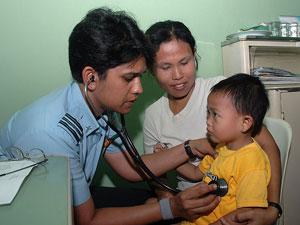Should we try to end disease?
This story was originally covered by PRI’s The World. For more, listen to the audio above.
A 9-month-old girl from the former Soviet Republic of Tajikistan has been confirmed as the first case of polio in Russia 13 in years. Tajikistan had been certified polio free eight years ago. Health officials say the virus entered the country from India, one of the few countries—along with Pakistan, Afghanistan, and Nigeria—where polio has never been wiped out.
About 2,000 cases of polio show up annually throughout the world. But public health officials have been unable to reduce that number by much over the last decade. Carol Pandack, who runs the polio program for Rotary International, told “The World,” “this last mile in this race, that has clearly been very challenging.”
Some are now questioning whether the eradication of polio should be the goal for organizations like Rotary International. In an interview with “The World,” University of Pennsylvania bioethicist Arthur Kaplan said:
Trying to get the last 20,000 cases of polio in a country may mean that we’re not getting them clean water which would benefit hundreds of thousands or millions of people. Trying to chase down the last hundred cases in Afghanistan may mean that there’s no hospital built because all the money went into the polio eradication campaign.
A similar debate is happening with regards to combating AIDS. According to “Here & Now” host Robin Young, big donors have started to shift their focus away from AIDS, toward other killers like worms, polluted water, and malaria. Some have made the calculation that they can save more lives with less money by cleaning water or providing malaria nets than they can by combating AIDS.
“We don’t have the luxury to make” that calculation, Emi McLean, director of the access to essential medicines campaign for the international humanitarian group Doctors Without Borders. AIDS is responsible for more than 50 percent of all deaths in six countries in sub-Saharan Africa. The international community made a commitment to stopping the disease, and it would be irresponsible to step away from the commitment now.
The upfront cost shouldn’t be the issue either, according to Pandack: “It may cost a lot in the short term to finish polio, but over the long term it is a much better investment than having to spend this much money every year indefinitely.”
PRI’s “The World” is a one-hour, weekday radio news magazine offering a mix of news, features, interviews, and music from around the globe. “The World” is a co-production of the BBC World Service, PRI and WGBH Boston. More “The World.”
